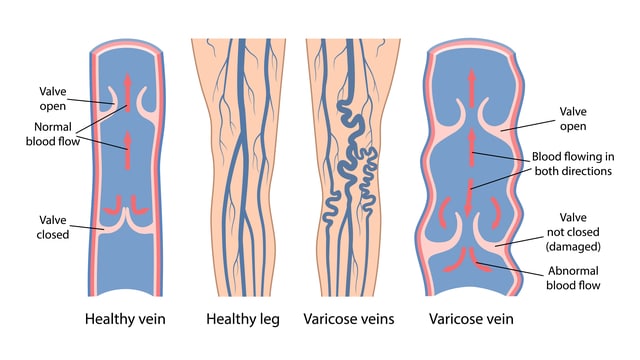From the way they look to the uncomfortable symptoms and the risk of more serious health issues – varicose veins are a condition most people would like to avoid. Although there are ways to reduce your risk, with things like exercise, diet and lifestyle, unfortunately, some factors such as genetics, are out of your control. But, does height cause varicose veins? And if so, is there anything that can be done to prevent them from developing?
What are the main causes of varicose veins?
Several factors make a person more likely to develop varicose veins, and genetics are the most common. There is strong evidence showing that weak veins and vein valves are inherited. Your unique genetic profile determines the strength of your vein walls, valves and muscle density – all of which provide support to your circulatory system.
Some of the other more common causes include:
- Gender: generally women are more prone to the condition.
- Age: as we age, our veins naturally become weaker.
- Pregnancy: due to a combination of hormones and the increased weight and pressure on the leg veins, pregnancy can often cause varicose veins.
- Obesity: carrying excess weight can cause additional stress on the veins.
So, does height cause varicose veins?
For a long time, vein experts have suspected that taller people are more likely to develop varicose veins, but that was primarily based on the statistics of people receiving treatment. About three years ago, an extensive study of over 400,000 people was undertaken by a team at Stanford University School of Medicine to research this theory further and determine the root cause.
What they found was that the taller you are, the higher your risk for varicose veins.
Some may think it is because longer legs mean there is more distance for the blood to travel but it’s actually because of specific genes.
The genes that cause people to be taller seem to also be what increases the odds of varicose veins developing. This means that while it’s not a sure thing if you’re taller than average (above 175cm for men, 162cm for women), there is an increased risk.
Is prevention possible?
Varicose veins occur when the valves in your blood vessels become weakened, damaged or fail to work properly. While genetic factors can increase your likelihood of these faulty veins developing, there are steps you can take to counteract this risk, including;
- A healthy diet: saturated fats aren’t good for your body in general, especially your veins. When you have too much, it can start to build up and form plaque which narrows the vein canal, slowing blood flow.
- Regular exercise: if you don’t currently have varicose veins, exercising can lower the risk of them developing by boosting blood flow. This in turn helps to strengthen the muscles and regulate circulation.
- Inactivity: avoid extended periods of sitting or standing still (get up and walk around every 20 minutes or so).
- Wear compression stockings to support the veins and reduce any pooling of the blood.
Just like height won’t be a sure thing to cause veins, these steps aren’t guaranteed to stop them. If you develop varicose veins or have existing ones, having them medically treated is an option well worth exploring for long-term relief.
Seek expert advice
The doctors at The Vein Institute specialise in varicose vein treatment. We offer patients a comprehensive program using non-surgical laser treatment techniques. You can learn more in our Definitive Guide to Varicose Vein Treatment.
The benefits of non-surgical varicose vein treatment are:
- Walk-in walk-out treatment
- 98% success rate
- Extremely effective
- Can be performed at a clinic (no hospitalisation)
- No general anaesthetic
- Medicare rebates apply
- No downtime or time away from work
Call us on 04 2010 2637, or fill out our booking request form.



